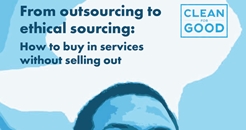 From outsourcing to ethical sourcing
From outsourcing to ethical sourcing
From a report by Clean for Good
The UK has seen unprecedented challenges in 2020, prompting much discussion about how we as a nation can ‘build back better’. In particular, the rise of Covid-19 has exposed some of the poor working conditions which some workers in the UK experience. People earning less than a Living Wage, some of these even earn below the Minimum Wage.
Clean for Good, an ethical cleaning company in London, believes that every employer has the power to effect significant social change right now – through their purchasing and outsourcing decisions.
In a report, they set out why outsourcing matters and how it can be done better. No organisation is self-sufficient. Every employer relies on a network of suppliers. Outsourcing is a huge market. Done well, it can deliver innovation, efficiency and positive outcomes. Done badly, it can cause serious reputational damage.
The key risk with outsourcing is that an employer may find themselves buying a service that is produced in a way which is seriously out of step with their own standards of behaviour.
This is because procurement often lacks transparency – it can be a ‘black box’. Too many employers don’t just outsource a service, they unwittingly outsource their values and responsibilities.
The litmus test when outsourcing a service is to look inside the ‘black box’ and understand how the workers involved are being employed, paid and managed – and how this compares with your own practices in-house. There are three key questions:
-
What wages are the workers being paid? Do they receive a Living Wage? Today, five million workers in the UK still earn less than this.
-
What is their employment status? Employed workers benefit from more protections (like paid sick leave) as well as having a more predictable income. Zero-hours contracts and self-employment offer less protection.
-
What are their terms and conditions – particularly sick pay, holidays and pensions? The statutory minimum employment conditions allowed by law are low. We have seen the tragic consequences – and the serious risks to the employer – of employing workers on terms and conditions offering such limited protection.
The procurement ‘black box’ is inconsistent with ethical purchasing: it has to be opened. Social and environmental responsibility requires intelligent and well-informed procurement.
The UK’s employers - of all sectors – between them have tremendous power to deliver lasting social change – through their purchasing. We do not have to wait for Government action - you can change your procurement processes today.
See the Ethical Sourcing report here.
Retweet about this article:
From a report by Clean for Good, 02/09/2020